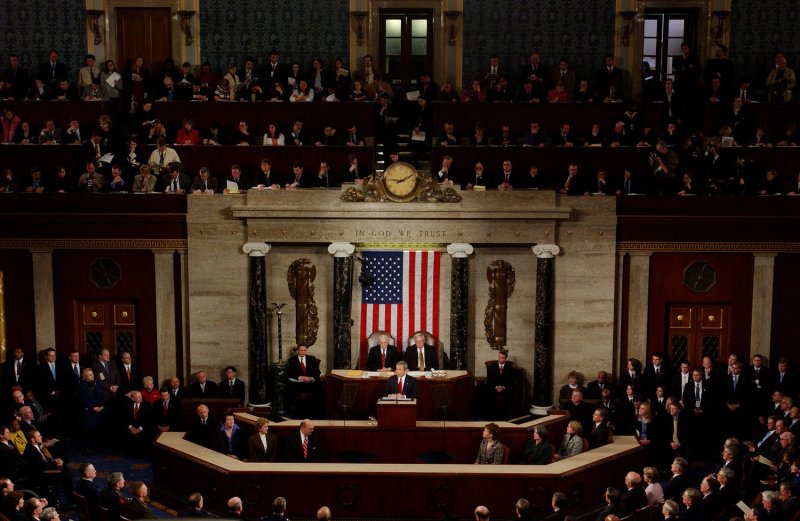Democrats stand to lose as many as 50 seats in the House, which would put Republicans back in control. (UPI Photo/Michael Kleinfeld) |
License Photo
Independent political handicappers are having a field day with the ever-expanding number of U.S. House races considered competitive.
The Cook Political Report puts the number of races at 92 -- 85 held by Democrats and seven controlled by Republicans, The Washington Post reported. Rothenberg Political Report pegs the number seats really in play at 97 -- 88 held by Democrats and nine by Republicans.
Pundits offer two reasons for this year's wide-open midterm elections: Voters simply are tired of politics as usual and are prepared to throw the bums out, and Democrats held on to nearly all of their seats in the last four years while making gains in some very tough, typically red, territory.
Analysts say Republicans, who only need a net 39-seat gain to regain control of the House, could pick up 40-50 seats, meaning they have a wider margin of error for losses than the majority party.
All of this isn't good news for House Speaker Nancy Pelosi, who has pushed through a liberal agenda only to see some of the bills passed by the House stall in the Senate.
If the Democrats get their predicted drubbing Nov. 2, it would be a "public repudiation" of Pelosi's impressive policy accomplishments -- including passage of the economic stimulus package, the bank bailout and healthcare reform, said Steven Schier, political science professor at Carleton College in Northfield, Minn.
Longevity, usually an incumbent's friend, can be a foe this year, Cook Political Report said. Exhibits A, B and C are GOP candidates using the congressional tenures of Reps. Solomon Ortiz of Texas, elected in 1982 to represent the 27th Congressional District created through redistricting; Barney Frank of Massachusetts, elected in 1980, and Jim Oberstar of Minnesota, who assumed office in 1975. Internal GOP polling indicates the races are tighter than once thought.
"The parties are very divided on all the major issues of the day," Schier said. "And all the energy is in the Republican Party right now."
Five themes are dominating this election, CBS says:
1. Voter angst at President Obama for dashing hopes. The feel-good, we-can-do-anything atmosphere when he was elected in 2008 has yielded to feelings of fear about the economy, jobs and the direction of the country -- and voter discontent Republicans hope to exploit.
2. The rise of the Tea Party movement, riding the anti-anything-Washington mood. Conservatives, independents and people normally not involved in politics reacted to Obama's policies and the economic downturn with a verve not seen in quite some time, analysts told CBS. Emboldened voters showed veteran GOP politicians the door in several party primaries and got involved in party politics -- and now more than a few candidates tout Tea Party support.
3. Pumped-up voters from 2008 staying home in 2010. First-time voters, young people, blacks and suburbanites were key to victories for Obama and many Democrats in red-leaning districts in 2008. Analysts ask: Will they return in 2010 since Obama isn't at the top of the ticket?
Encapsulating the worries about voters staying home are three Ohio representatives -- John Boccieri, Mary Jo Kilroy and Steve Dreihaus. Observers say all are vulnerable for supporting legislation on the economic stimulus, healthcare reform and cap-and-trade. Driehaus and Kilroy could be in trouble if the minority turnout in 2008 isn't there in November.
Conservatives may have the edge on enthusiasm, but Democrats are working to get voters to the polls through Organizing for America, led by Obama's 2008 campaign architect David Plouffe, who has set a goal of turning out 15 million voters on Election Day.
4. Looking ahead to 2012 and the next decade. It's the perfect storm -- 37 governorships at stake this election occurring the same year as the U.S. Census, which could change the makeup of Washington for the next 10 years thanks to redistricting.
Losing control of Congress for Democrats would be bad, but losing a few governors' mansions could be devastating because of the influence governors have in remapping the districts. Political scientists already see a three-seat gain in Texas and a two-seat loss in Ohio.
5. The bona fides of who's best qualified to rescue the economy -- the businessman or the politician. This year it's the economy, the economy, the economy and Republicans are blaming Democrats for voting for what the GOP is painting as a liberal agenda that hasn't improved the economy one whit, analysts said. The GOP is running business-savvy candidates -- such as former HP chief Carly Fiorina in the California U.S. Senate race -- to make the case they can best right the country's economic ship.















